Inspired
Jackie Robinson Inspired
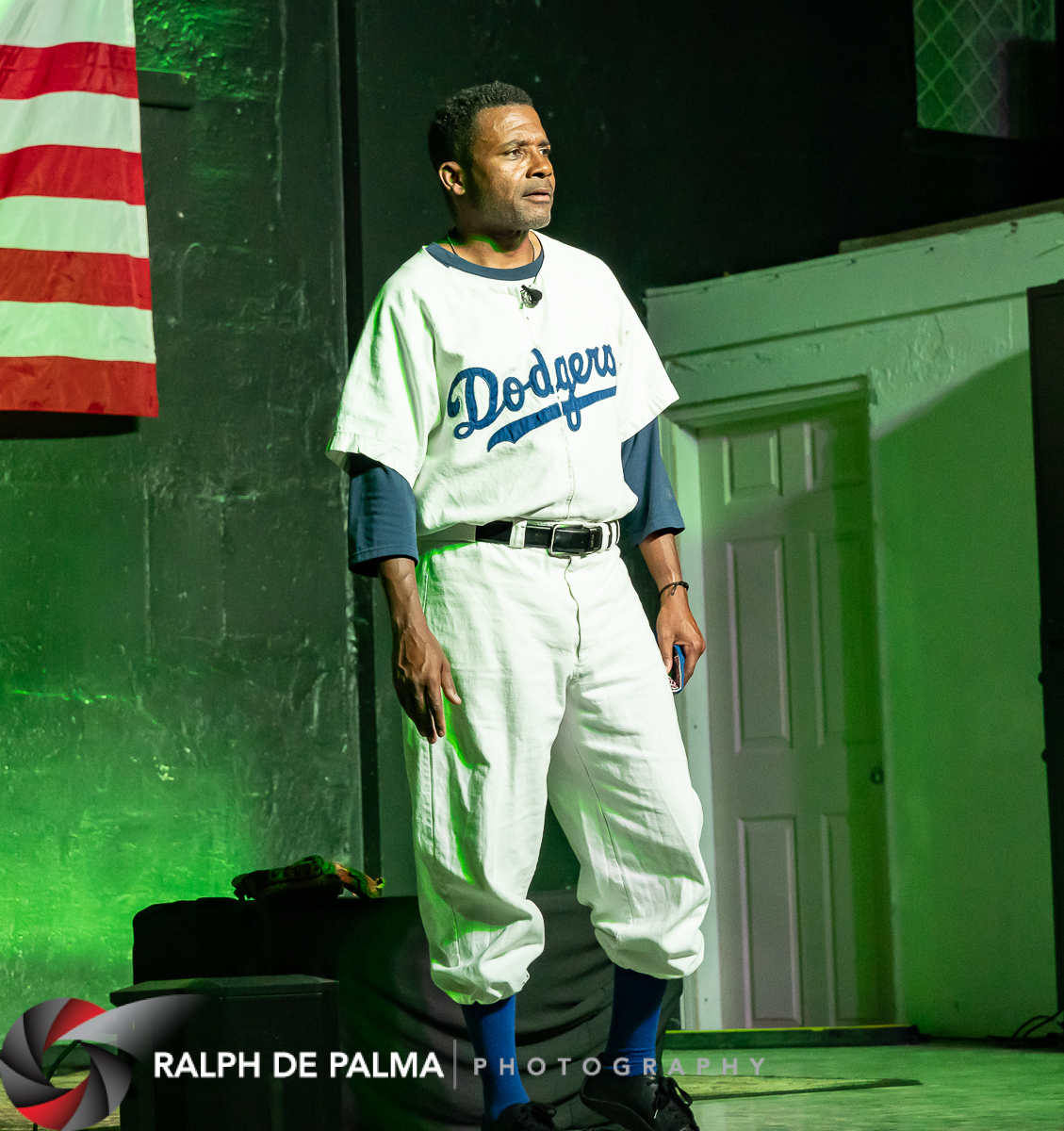
Mike Wiley presenting the story of Jackie Robinson breaking the color barrier in Major League Baseball, April 15, 1947. — Presented at the historic American Legion Post 168 at 803 Emma Street in Bahama Village.
In the Spring of 1947, the “great war” was over and our soldiers came back home. A young teenage shortstop at Key West’s then segregated Fredrick Douglas High School read the story of Jackie Robinson. Robinson had broken the color barrier in Major League Baseball, signing with the Brooklyn Dodgers and started at second base on April 15, 1947.
The young shortstop played outstanding baseball in the Bahama Village. He started all four years and his coaches were very high on him, his name was Lofton Ambrose Butler (aka: Coffee Butler). Jackie Robinson, originally started at shortstop and later moved to second base, gave Coffee the inspiration to dream of a Major League baseball career. That inspiration lasted a lifetime.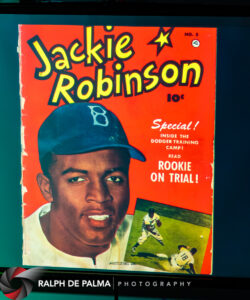
Seventy-eight years later, on April 18, 2025, Jackie Robinson was remembered by a powerful one-man performance by Mike Wiley at the American Legion Post 168 in Bahama Village. It was the perfect venue for this story to be told, as Post 168 was referred to as the Black City Hall in the 50s. Wiley dug deep into history, starting with the emancipation of slaves that suddenly had freedom and the right to vote but soon discovered how difficult their freedom would become. He presented the huge obstacles set up by Jim Crow laws in the South that would take another 100 years to overcome.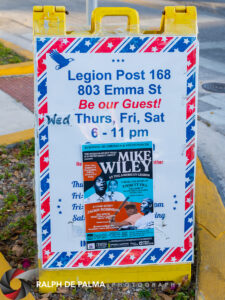
There was a short video showing Jackie Robinson’s rise to baseball fame with the song, “Did You See Jackie Robinson Hit That Ball” by Buddy Johnson and recorded by Count Basie in 1949 and later by many others. Wiley didn’t mention baseball again until the last 20 minutes of his two-hour presentation. He gave stark examples of mistreatment and prejudice of the segregated South towards the newly freed slaves that would more often than not go back to work for their former slave owners as “share croppers”.
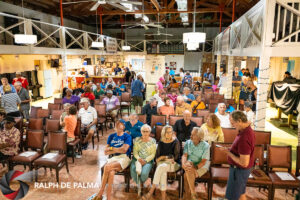
The audience inside American Legion Post 168 waiting for the Jackie Robinson presentation.
To understand the importance of Jackie Robinson, the audience needed to understand the impact of Jim Crow racism. He spoke of other black athletes that had to overcome such as Fritz Pollard, the first black player in the 1916 Rose Bowl. Wiley used audience members to “make it real”, performing short skits about how black jockeys were banned from horse racing. Some stories had different endings like U.S. Heavyweight Champ Joe Louis who defeated the mighty Nazi heavyweight champ Max Schmeling within two minutes of the second round in June 1938.
He used members of the audience as the Pepper Street Gang of Jackie Robinson’s old neighborhood who were reprimanded by a police officer for swimming in the town reservoir because they were black. Another skit included an Olympic Gold Medal Champion wanting to march in a parade but the city commission would not vote to integrate their parade. An audience member portrayed a uniformed WWII US Army soldier Jackie Robinson, who was ordered to give up his seat on a bus to a white soldier. He refused saying he was wearing the same uniform and fighting for the same freedom as the white soldier.
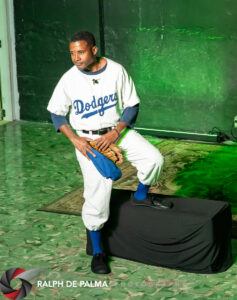
Mike Wiley at the historic American Legion Post 168, presenting the story of Jackie Robinson.
While playing in the Negro Leagues, they stopped to fill up the team bus at a gas station. Robinson was refused the use of the restroom. He stopped the driver filling up the gas tank and the station owner ask what happened, they said they would buy their fuel elsewhere. The owner quickly said okay, you can use the restroom but be quick.
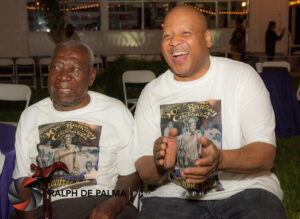 When the Dodger President and General Manager Branch Rickey explained to Jackie Robinson that he knew he was a great baseball player and asked him to sign a contract that he would agree to not “Fight back”.
When the Dodger President and General Manager Branch Rickey explained to Jackie Robinson that he knew he was a great baseball player and asked him to sign a contract that he would agree to not “Fight back”.
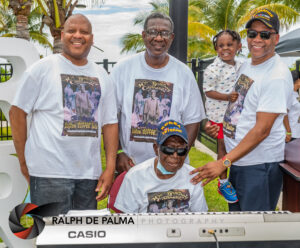
Coffee Butler and family at the dedication of the Coffee Butler Amphitheater.
Jackie had fought for his self-respect all his life but Branch Rickey was asking him not to fight back. Jackie would be slandered and he would be taunted, but did he have the guts not to fight back. Rickey said we have to prove to everyone that you are “a great baseball player and a fine gentleman”. Branch Rickey was right Jackie proved to everyone that he deserved to be a Dodger.
While back in Key West, that young teenage shortstop Coffee Butler in Bahama Village wanted to be the next Jackie Robinson to break into the Major Leagues. He tried out for the Kansas City Monarchs of the Negro League but disappointedly didn’t make it. Coffee had the heart and was inspired but they probably wanted bigger players – Jackie Robinson was almost 6 feet tall and played at 200 lbs. Coffee started in the Florida Cuba League for the Palm Beach Rockets for two years. He was drafted into the Army after his service, he returned to Key West.
His piano teacher, Miss Ellen Welters Sanchez never gave up on Coffee. In 1948, she had Coffee perform her original song, “The Beautiful Ilse of Key West” for President Harry Truman at the dedication of Truman Avenue. Coffee was always her favorite student and she knew he had the talent. She knew he could be the best. Coffee knew it too.
He revived his father’s Junkanoo band and started Duke and the Royal Aces. Later he formed the trio, Coffee and His Cups, with a first gig at Johnny Neebo’s Starlight Club on then segregated Duval Street. A Jackie Robinson inspired Coffee Butler proved to everyone that he deserved to be considered the best entertainer in Key West for the next 50 years.
In 2020. the City Commissioners voted unanimously to name the new Key West amphitheater in his honor. The Coffee Butler Amphitheater was his well-deserved life-long recognition. I remember watching high school baseball games on TV with Coffee into his 90s. He was still inspired and loved baseball.
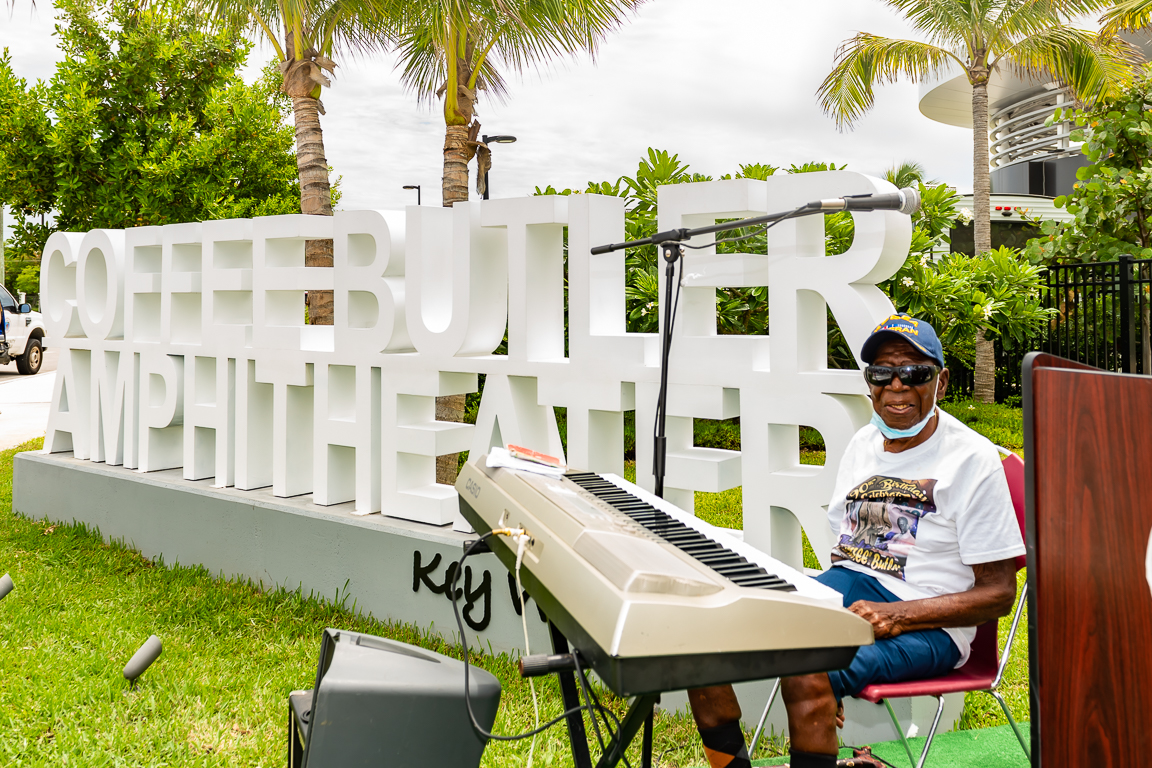
Coffee Butler at the COVID interrupted dedication of the Coffee Butler Amphitheater June 19, 2020.
There are no comments yet, add one below.



Leave a Reply